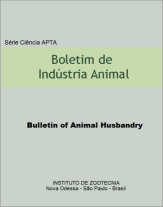Gestational stress in sheep and lambs at birth
Keywords:
birth weight, cortisol, LPSAbstract
The stress in animals is linked with possible unusual changes that reduce the individual welfare. These changes generally related to the environment or to animal physiology cause imbalance in the biological reactions as a defense by releasing certain substances, including cortisol. There are few studies which indicate that there is heritable consequences promoted by cortisol generated by stress during pregnancy on the first hours of life of the lamb and the gestational phase (days of gestation) in which stress was promoted also interferes with it. Thus, the aim of this study was to evaluate during the delivery time the cortisol levels of lambs and sheep subjected to stress in different weeks of pregnancy and the effect on the birth weight of the lambs. The study was approved by Ethics Committee of FZEA/USP (13.1.2109.74.8). Forty crossbred Santa Ines ewes, multiparous, with an average age of 5 years and 60 kg of body weight (BW), grazing on Coast-cross were used (Cynodon dactylon (L.) Pers.) on rotated system, with free access to shade, water and mineral supplementation. All experimental ewes were artificially inseminated with semen from White Dorper breed. During gestation, the ewes were divided into three groups on a completely randomized design: CG - control group of 15 animals that were not subjected to stress; GI - intermediate group of 12 animals that suffered stress at 70 days of gestation; GF - final group, consisting of 13 animals undergoing stress at 120 days of gestation. The groups were challenged underwent intravenous application of 0.8 μg.kg-1 of LPS (lipopolysaccharide E. coli) - outer cell membrane of gram-negative bacteria, diluted in saline solution - simulating an immune stressor for this evaluation. Shortly after birth, after the first feeding of colostrum, ewe and lamb were contained to the blood sample to be taken from the jugular vein for cortisol analysis, followed by birth weight measurement. An analysis of variance with multiple comparisons of means by Tukey test at 5% was performed. No significant differences (P>0.05) for cortisol levels of ewes were found soon after birth in the three treatments. The mean serum cortisol found for the three treatments was 32 mg/ml, which is considered high for the species. Similarly, cortisol levels of the lambs, moments after birth, did not significantly vary (P>0.05) regardless of the stress suffered by their mothers during gestation stages. There was also no correlation between cortisol of mothers and their children in the postpartum (P>0.05). In relation to birth weight, the animals of GI (P 0.03) and GC (P=0.06) had higher averages when compared to lambs of GF, with values of 3.694 (± 0.2), 3.56 (± 0.17) and 3.077 (± 0.19) kg respectively, showing a greater effect of stress in the final third of pregnancy on birth weight. The stress in different gestational weeks in ewe did not affect cortisol levels at birth, but the birth weight of lambs.Downloads
Downloads
Published
Issue
Section
License
Os autores não serão remunerados pela publicação de trabalhos, pois devem abrir mão de seus direitos autorais em favor deste periódico. Por outro lado, os autores ficam autorizados a publicar seus artigos, simultaneamente, em repositórios da instituição de sua origem, desde que citada a fonte da publicação original seja Boletim de Indústria Animal. A revista se reserva o direito de efetuar, nos originais, alterações de ordem normativa, ortográfica e gramatical, com vistas a manter o padrão culto da língua e a credibilidade do veículo. Respeitará, no entanto, o estilo de escrever dos autores. Alterações, correções ou sugestões de ordem conceitual serão encaminhadas aos autores, quando necessário. Nesses casos, os artigos, depois de adequados, deverão ser submetidos a nova apreciação. As opiniões emitidas pelos autores dos artigos são de sua exclusiva responsabilidade. Todo o conteúdo deste periódico, exceto onde está identificado, está licenciado sob a Licença Creative Commons Attribution (CC-BY-NC). A condição BY implica que os licenciados podem copiar, distribuir, exibir e executar a obra e fazer trabalhos derivados com base em que só se dão o autor ou licenciante os créditos na forma especificada por estes. A cláusula NC significa que os licenciados podem copiar, distribuir, exibir e executar a obra e fazer trabalhos derivados com base apenas para fins não comerciais.













